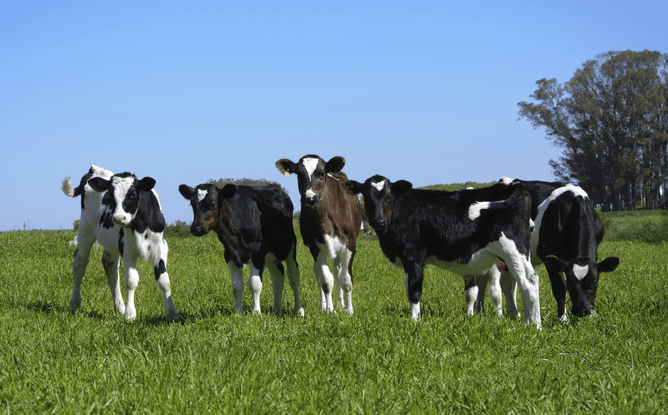Weaning your calves based on weight and meal intake ensures their successful transition towards becoming healthy heifers.
To meet their weaning weights, calves need the appropriate amount of feed and to be properly prepped. Weaning can be quite a challenging, transitional time for calves since their main source of food changes from liquid (milk) to solid (pasture) and they are going to be exposed to new bugs when they go into new areas of the farm.
Before weaning, some factors need to be considered:
Is the calf eating enough?
Has its rumen developed properly?
Is it meeting its weight targets?
Is it the right age?
Is it able to compete with the other calves?
Rumen development is the most important aspect to consider when weaning calves. The rumen must not be rushed when transitioning the calf from a milk-based diet to a full pasture diet.
Allotting at least a 2-week gap between the diet change, with a gradual or stepwise process of removing milk slowly, allows the rumen to adjust to the change in feed. Always monitor calf behaviour and meal intake and identify calves that may be struggling.
If meal has been a part of their calf diet, continue to give this for at least another 2 weeks after weaning from milk to reduce growth checks while their rumens are adapting to the high pasture intake.
Weaning weights
Replacement calves should meet a minimum weight before they are weaned. Each farm will have a different target weaning weight, which will be dependent on what type of rearing system is being run.
Minimum weaning weights are:
70kg for Jerseys;
80kg for Friesian X Jerseys;
90kg for Friesians.
However, heavier weaning weights will translate to better grown heifers. It is recommended to weigh the calves again 1-2 weeks after weaning to make sure they have gained weight since being transitioned. If they are still struggling, continue to offer meal.
Other things to consider during this weaning period:
Pre-weaning drench – as calves start to go into the paddocks, they are likely to come into contact with new worms and bugs. Drenching them before starting the weaning process will ensure they do not get overwhelmed by these new parasites. We recommend Turbo Initial, as this not only has a novel active ingredient, but it also contains a coccidiostat which will help protect them against coccidiosis, which is common during this transition period.
Trace element supplementation – calves will be undergoing a lot of stress at weaning, with the change in diet, change in environment, and change in groupings. We recommend an injection of Multimin, pre-weaning, as this will not only keep them up to date with their trace element levels, (especially copper, which helps with growth and development), but also boosts their immune system to cope with the transition.

